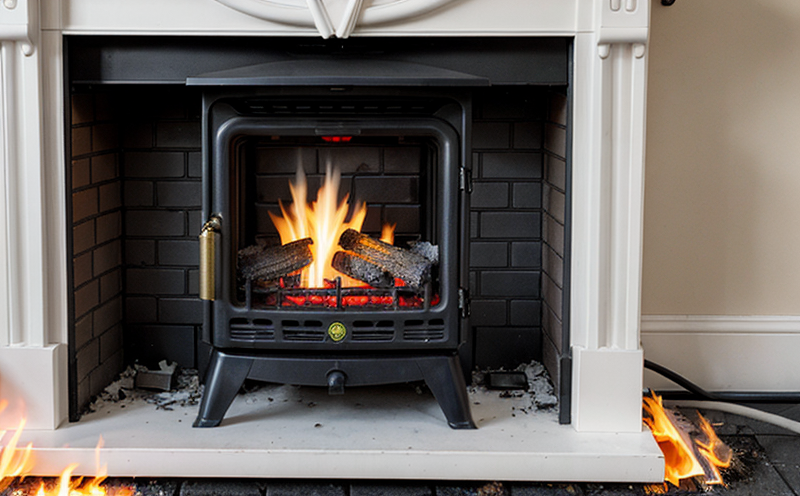BS EN 1102 Ignitability of vertically oriented textile products
The BS EN 1102 standard is specifically designed to assess the ignitability characteristics of textiles when they are in a vertical orientation. This testing protocol is crucial for ensuring that textiles used in various applications, such as upholstery, seat covers, and other fabric-based products, meet stringent safety requirements.
The test method involves exposing vertically oriented textile specimens to a flame source for a specified duration under controlled conditions. The primary objective of this test is to determine the time taken by the specimen to ignite, the propagation rate of the flame along its surface, and the residual lengths of the flame after it has been removed from the heat source.
The standard provides detailed guidelines on how to prepare specimens for testing, including specific dimensions and shape requirements. Proper specimen preparation is critical as any deviation can lead to inaccurate results or even failure of the test. The apparatus used in this procedure includes a test chamber that maintains a constant temperature and humidity level throughout the duration of the test.
Following ignition, the time it takes for the flame to travel across the entire width of the specimen is measured. This measurement helps assess the ease with which the textile ignites and spreads fire. Additionally, the length of the residual flame after removing the heat source provides insights into how quickly the fabric can self-extinguish.
The acceptance criteria in BS EN 1102 are based on the time taken for ignition and the maximum length of the flame that travels across the specimen. If these parameters fall within specified limits, the textile is deemed to have passed the ignitability test. Compliance with this standard ensures that textiles used in high-risk environments meet stringent safety standards.
This testing procedure is particularly important in industries like automotive manufacturing, furniture design, and home furnishings where fire safety is paramount. By adhering to BS EN 1102, manufacturers can ensure their products are safe for consumers while also complying with regulatory requirements.
It's essential to note that the test parameters such as flame duration, specimen dimensions, and temperature conditions are critical factors in determining the accuracy of the results. Any deviation from these parameters could lead to unreliable or inconsistent outcomes, which may affect product safety and compliance.
The implementation of BS EN 1102 ignitability testing not only enhances product safety but also supports brand reputation by demonstrating a commitment to quality and consumer protection. This is especially important for companies that operate in regions where strict fire safety regulations are enforced.
Furthermore, the results from this test can be used as part of the overall quality assurance process during product development, ensuring that all products meet not only regulatory standards but also exceed expectations in terms of safety and performance.
Benefits
- Ensures compliance with international safety standards (BS EN 1102).
- Enhances product safety in high-risk environments.
- Safeguards consumer welfare by reducing the risk of fire incidents.
- Supports brand reputation through adherence to stringent quality assurance processes.
- Promotes regulatory compliance, ensuring products meet legal requirements for fire safety.
Eurolab Advantages
At Eurolab, we offer comprehensive textile testing services that include BS EN 1102 ignitability testing. Our expertise and state-of-the-art facilities ensure accurate and reliable results every time.
Our team of professionals is well-versed in the latest testing methodologies and can provide guidance on specimen preparation, testing procedures, and interpretation of results. This comprehensive approach helps clients make informed decisions about their product development processes.
We also offer additional support services such as training sessions for quality managers and compliance officers to help them understand the nuances of BS EN 1102 and other relevant standards. Our commitment to excellence extends beyond testing; we are dedicated to helping our clients achieve their business goals through reliable, high-quality results.
Competitive Advantage and Market Impact
By incorporating BS EN 1102 ignitability testing into your product development process, you can gain a significant competitive edge in the market. Consumers are increasingly demanding safer products, and compliance with international standards like BS EN 1102 can help you meet these expectations.
Achieving this certification not only enhances your brand's reputation but also opens up new markets where stringent fire safety regulations apply. It demonstrates a commitment to quality and consumer protection, which is crucial for maintaining long-term customer loyalty and trust.
In addition, the detailed insights provided by our testing services can help you identify areas for improvement in product design and manufacturing processes. This proactive approach ensures that your products are not only safe but also exceed industry standards, setting a benchmark for quality.





